Three More Iranian Apps Removed From Google Play
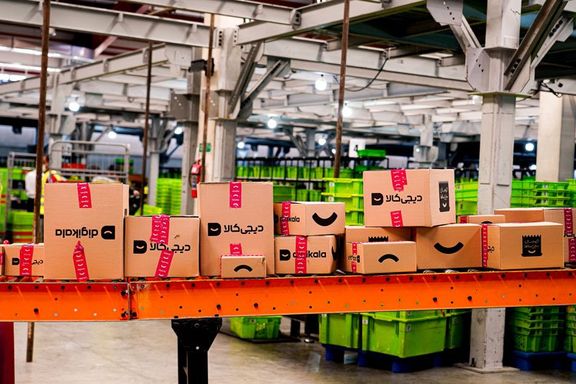
After the removal of Iran-based marketplace app Divar from Google Play, three more major Iranian apps have been suspended.

After the removal of Iran-based marketplace app Divar from Google Play, three more major Iranian apps have been suspended.
The removal of Digikala, Tapsi and Ap is believed to have taken place due to conforming with US sanctions against Iran.
Several days ago, Divar, a popular online shopping program, was removed from Google Play for being Iran-related.
“Products on Google Play may be subject to United States’ and other jurisdictions’ export control and sanctions laws and regulations,” read Google’s email.
It is not the first time this has affected the apps. Ridesharing app Tapsi and e-commerce platform Digikala, as well as Snap, were removed from Google Play recently but following legal proceedings, were brought back to the platform.
This week, Divar announced they are taking legal steps to contest the decision.

A free trade zone deal between Iran, Russia and several countries in the vast Eurasian region is possible by the end of the year, Russia's TASS news agency reported on Monday.
Russian Deputy Prime Minister Alexei Overchuk told the state TASS agency that talks between the Eurasian Economic Union - which comprises Armenia, Belarus, Kazakhstan, Kyrgyzstan and Russia - and Iran are in their final stages.
"We are moving forward," Overchuk said. "We very much hope that such an agreement can be signed by the end of the year."
Both the region and Iran have taken on additional significance for the Kremlin after Western sanctions over Moscow's invasion in Ukraine limited Russia's foreign trade routes and forced it to look for markets outside Europe.
However, despite tighter ties between Moscow and Tehran since Russia invaded Ukraine in February 2022 and began big purchases of Iranian-made drones to attack the country, trade between the two markets have grown only moderately.
Russian-Iranian commodity turnover rose 20% in 2022, according to government data, but the monetary value of bilateral annual trade was less than $5 billion, negligible by international standards.
The regional agreement with Iran would replace and expand an interim pact that already provides a reduction in customs duties on hundreds of categories of goods.
In November 2022, Russia started swapping oil products with Iran and in March, Tehran said it counts on "huge volumes" of both oil and gas swaps with Moscow.
Overchuk also told TASS, without providing much detail, that negotiations among the Eurasian Economic Union countries on creating a common gas market continue.
Reporting by Reuters
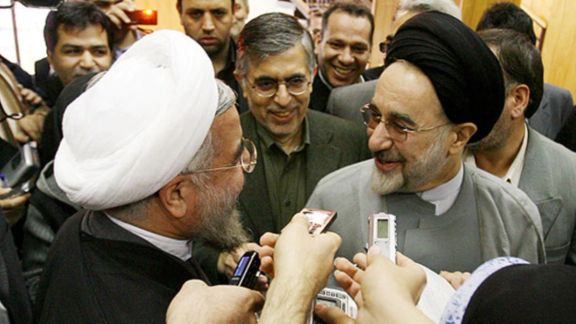
Two of Iran's former presidents, Hassan Rouhani and Mohammad Khatami have highlighted Iran's missed foreign policy opportunities, blaming hardliner conservatives.
Referring to Iran's rapprochement with Saudi Arabia, Rouhani said during a recent meeting with his aides, "It is good that everyone in Iran has understood that you cannot write slogans on missiles, set fire to embassies and make trouble."
Rouhani was referring to the IRGC's behavior following the 2015 JCPOA nuclear deal with the West when they wrote "Death to Israel" on missiles they tested, and the conservative-led vigilantes' behavior in an arson attack on the embassy of Saudi Arabia in January 2016 which led to the severance of ties between Tehran and Riyadh for seven years.
The Obama administration concluded the JCPOA agreement hoping to restrict Iran’s nuclear program and open the door to more moderating diplomatic interaction.
The nuclear deal was concluded during Rouhani’s term in office (2013-2021), who is considered a pragmatist and a moderate compared to many other regime insiders.
But both the permission to conclude the deal and the extremist behavior by hardliners were condoned by Supreme Leader Ali Khamenei. The first was to lift international sanctions, and the second was to continue his anti-West, anti-Israel policies.
Meanwhile, in a reference to the resumption of ties with Saudi Arabia and Supreme Leader Ali Khamenei's recent statement about cooperation with the UN nuclear watchdog IAEA, Rouhani welcomed "the agreements with the IAEA and Saudi Arabia."
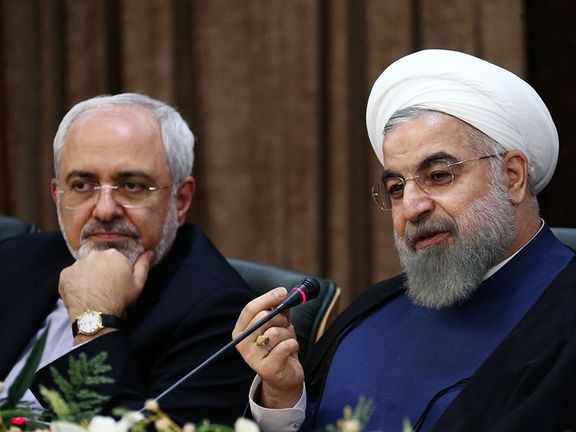
Speaking on domestic politics and the political impasse created by hardliners restricting voters’ choices in parliamentary and presidential elections, Rouhani said: "What determines the country's fate is the people's vote. Everyone in this country acknowledges the power of votes. Without the people's vote we cannot solve any problem."
He added that Iran's population is 85 million and the government should stop keeping only three million of them happy.
Rouhani was alluding to the rule of minority following the consolidation of conservatives' political power after the 2020 parliamentary elections and the 2021 presidential election in which reformist and moderate candidates were barred from running.
Rouhani said: "Five months have passed since the protests in Iran. What have we done during these five months? It is not enough that the streets are calm. We should look for solutions for social problems to prevent further unrest." Nonetheless, he acknowledged that the political situation cannot be corrected overnight as structural changes are required to make the people happy.
Meanwhile, in a message to the congress of the National Development Party, former ‘reformist’ President Mohammad Khatami also pointed out roughly the same issues. Echoing Rouhani, Khatami said: "Had the nuclear deal been revived two years ago, we would have profited substantially. Nonetheless, anything that can improve the situation a little bit is desirable."
Meanwhile, he called on the government to respect the people's views and votes and their right to determine their fate. Khatami said in his message that "there is more fear and concern than hope in the Iranian society today." Like Rouhani, Khatami also advised that "the people need hope, they need to see an improvement in their political and financial situation."
He said the government's new approach to foreign policy that was manifested in the resumption of ties with Saudi Arabia was an example of what is needed to being about positive change in Iran.
Some of Iran's political observers, including Abolfazl Hassanbeigi, a veteran of the Iran-Iraq war and a former populist member of parliament, told a local website that the situation is ripe for rapprochement with the West, adding that US President Joe Biden needs a winning chip for his re-election campaign, even a short-term agreement with Iran.
Hassanbeigi opined that such a short-term and limited agreement will be mutually beneficial for both Iran and the United States. He claimed US officials have realized that their approach to Iran during recent years has weakened the United States and strengthened Iran.
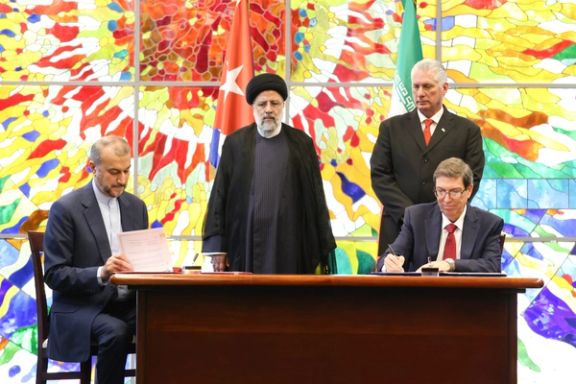
Iran’s President Ebrahim Raisi told his cabinet ministers not to overlook the implementation of 35 agreements he signed during his tour of three Latin American countries this week.
The government’s official news website IRNA in a long report Saturday highlighted Raisi’s trip to Venezuela, Nicaragua and Cuba, with the headline of “35 cooperation agreements signed under America’s nose.”
Iranian officials and government media have been emphasizing the significance of the three-nation tour as a challenge to the US “in America’s backyard.”
However, Iran is in relative international isolation as no Western countries and allies invite Iranian leaders or visit the country themselves. The three Latin American countries Raisi visited are also struggling economically under US sanctions and leftist ideological rule.
Raisi emphasized during his trip solidarity against the United States and cooperation to overcome sanctions.
During his meeting with Cuban president Miguel Diaz-Canel Raisi said, "The conditions and circumstances in which Cuba and Iran find themselves today have many things in common. Every day our relations grow stronger."
The Cuban president also praised close ties with Iran. "Venezuela, Nicaragua, Cuba and Iran are among the countries that have had to heroically confront sanctions...threats, blockades and interference by Yankee imperialism and its allies with a tenacious resistance, This visit reinforced our conviction that we have in Iran a friendly nation in the Middle East, with which to confide...and talk about the most complex global issues."
However, there is little in economic cooperation and trade the three countries can achieve with Iran, which faces a serious economic crisis, with by 70-percent inflation and a battered currency.
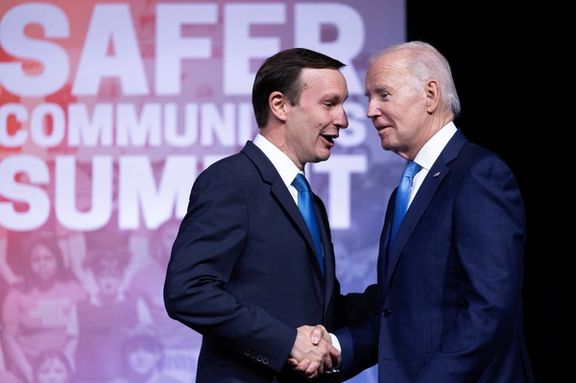
The Wall Street Editorial Board has slammed reported plans by the Biden administration to reach a limited nuclear deal with Iran in exchange for billions of dollars.
In an editorial on Friday, WSJ said the reported deal taking shape is not what President Joe Biden promised when he embarked on talks with the Islamic Republic in early 2021.
Biden had promised a “longer and stronger” agreement, the Journal said, “Now, in a remarkable retreat, the Biden Administration is pursuing an unwritten ‚understanding‘ with Iran to get to the brink of a nuclear breakout but go no further.“
The Biden administration has denied any deals with Iran, acknowledging that contacts were made to convey US demands. The latest denial came from Secretary of State Antony Blinken on Friday during a press conference.
“With regard to Iran, some of the reports that we’ve seen about an agreement on nuclear matters or, for that matter, on detainees are simply not accurate and not true,” Blinken said.
The WSJ says that in the deal taking shape Iran will keep all of its 60-percent enriched uranium, without clarity about international monitoring of its nuclear activities, while Tehran can break the unwritten “understanding” over any issue in the future.
The editorial also criticized a deal earlier this month that allows Iraq to release $2.7 billion of Iran’s frozen funds ostensibly for spending mainly on food imports.
"The Administration says Iran will spend the Iraqi funds only on food and medicine, as if money isn’t fungible. In reality the U.S. is freeing up billions of dollars that will finance the Islamic Revolutionary Guard Corps and its imperialism across the Middle East," the editorial said.
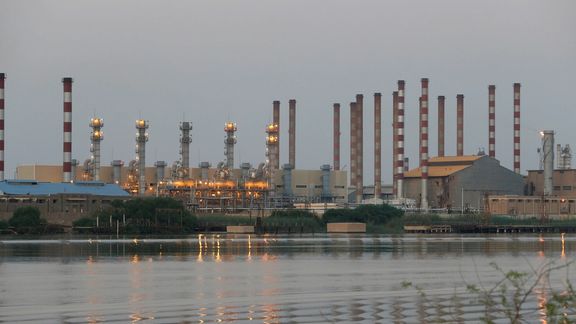
Iran’s oil sales have reportedly hit a record high since the US withdrew from the nuclear deal and reinstated sanctions in 2018, but pundits wonder where the money goes.
In an article on Friday, Bloomberg confirmed earlier claims by Islamic Republic officials about the rise in exports, saying that Iranian oil is quietly flooding into the global market again.
Citing data from market analytics provider Kpler, global strategic energy-consulting firm SVB Energy International, FACTS Global Energy Group (FGE) and the International Energy Agency, Bloomberg said that Iran’s exports have surged to the highest level in almost five years, “fortifying its re-emergence on the geopolitical stage while posing risks for a fragile global crude market.”
OPEC+ countries have repeatedly cut production to restrict supplies and control the plummeting prices.
“Iran’s crude exports smashed it last month,” said Homayoun Falakshahi, a senior analyst at Kpler. “Iranian crude is extremely interesting for those willing to take the risk to buy.”
As expected, Tehran’s ally China is its main customer, albeit with hefty discounts, which help smaller Chinese refiners offset a recent slump in profit margins.

While tanker-tracking shows that China has remained Tehran’s main buyer, official data registers no imports from the Islamic Republic in the past year. Instead, purchases have soared from Malaysia, where Iranian cargoes are often sent on a so-called “dark fleet” of tankers with transponders deactivated to avoid detection for transfer to another ship, blurring the origins of the consignment.
This practice has been going on since 2019, when the United States imposed full third-party sanctions on Iranian crude exports.
The regime is trying to save its battered economy through all means available, including mending relations with regional rivals Saudi Arabia, Bahrain, and Egypt; fostering ties with China; and most recently a tentative behind-the-scenes diplomatic effort to deescalate with Washington and the UN nuclear watchdog, the IAEA.
However, the extra sales have not been translated into tangible results in its rampant inflation rate at 70 percent, plunging national currency and popular dissatisfaction, manifested in periodic protests and strikes all over the country.
“China’s willingness to support Iran by taking its sanctioned oil, suggests a slight improvement in Iran-China relations,” Bloomberg quoted Greg Brew, an analyst at consultants Eurasia Group. He added that “All of this supports the view that Iran’s position is improving, along with its advancing normalization with other regional states,” especially given the fact the Beijing itself brokered the detente between Tehran and Riyadh, a rapprochement that was seen as a Saudi favor to China.
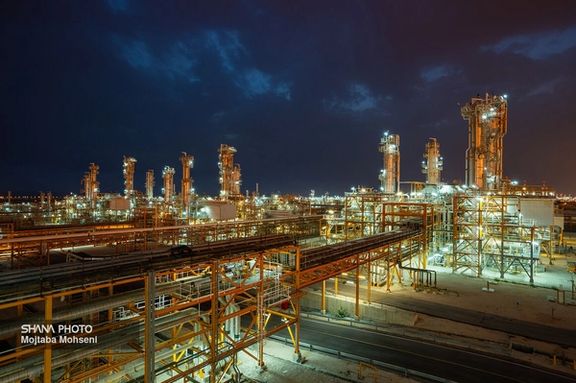
According to an article in Iranian daily Donya-e-Eqtesad, Iran’s oil exports – including crude, oil products, natural gas and condensates – was about $118 billion in 2011 when international nuclear sanctions were imposed, slashing the exports to half of that amount. Then came the 2014 oil price crash that pushed revenues down to $33 billion.
After the JCPOA was signed and international sanctions were lifted in 2015, Iran’s revenues began to rise and reached $66 billion in 2017 for a short while before the US pulled out of the JCPOA in May 2018 and again imposed sanctions that expanded a year later. By 2020, exports declined to about $20 billion and by some accounts to less than $10 billion.
The picture began to change toward the end of 2020 as Joe Biden won the presidential election and vowed to return to the JCPOA. At that point China began to increase oil imports from Iran.
Crude shipments have doubled since last autumn to reach 1.6 million barrels a day in May, even as American sanctions remain in place, Bloomberg claimed, citing Paris-based IEA as estimating that production has hit 2.9 million barrels a day, the highest since late 2018. “Consultants SVB Energy, Petro-Logistics SA and FGE believe that output is even higher, maybe surpassing 3 million barrels a day,” the report said.
Iran’s surge in shipments – and presumably the rise in revenues – has baffled economists and business analysts in Iran and abroad about where such a huge income is being spent, given that Iran’s currency has halved in value since mid-2022.
Mousa Ghaninejad, a professor of economics, recently said that “the oil money belongs to the people,” noting that “if the government takes it and spends it, so it should remove the taxes.”
He made the comment as the Raisi administration raised taxes by 59 percent in the budget bill of the current Iranian year (started in March), a staggering burden on its people amid high inflation and growing poverty. The total tax revenues planned in the draft budget will surpass $20 billion based on the current rate of exchange. In Iranian currency, however, this is a staggering 8.3 quadrillion rials – that is with 15 zeros.
Despite the huge tax bill for the people, the government budget still has a 50-percent deficit, due to a chaotic downturn in the economy mainly triggered by US sanctions on its oil exports and international banking.
According to a report by Tejarat News, the oil revenues are spent to balance the budget deficit as well as importing food items.
Aside from an overestimation of Iranian oil shipments, another explanation for the lack of a positive impact from increased exports is suspected deep discounts offered to China. Tejarat news for example said that China pays only two-thirds of the agreed price in cash and the rest is barter.
Iran also must undergo many other expenses for the illicit shipments and then lose more money trying to recoup revenues despite the US banking sanctions. Many different types of middlemen take huge profits for facilitating all these transactions. Otherwise, if Iran is charging even $60 a barrel, at the current rate of estimated exports, it would make $33 billion annually just from crude exports and more than $20 billion from oil products, balancing its budget.